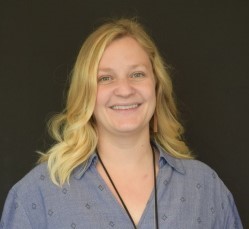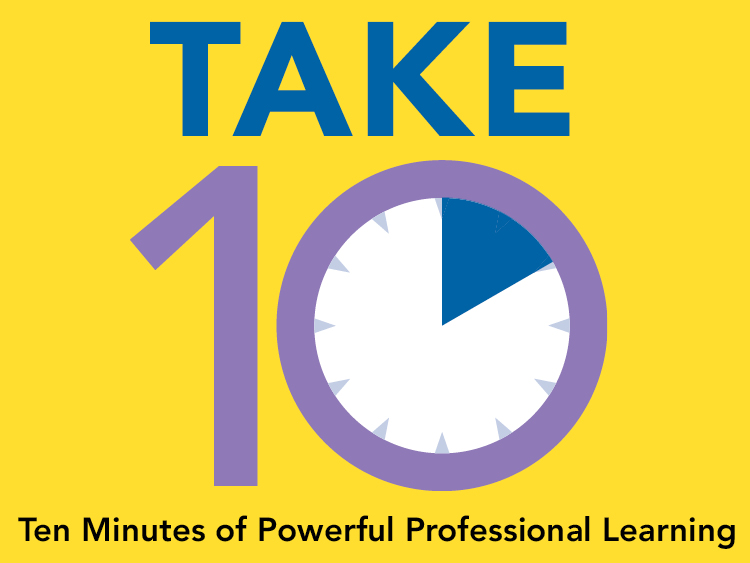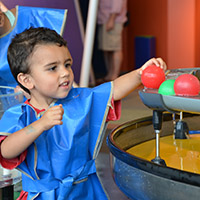We all know that asking our students questions as they engage in science learning is important, but it is also important to reflect on and plan out the purpose of the questions that we ask our students. There are many reasons and goals for encouraging questioning within the classroom. Just some examples of these goals are to reinforce or establish norms and routines, to engage students, to deepen student understanding, or maybe even to check for student understanding. It is just as important for us to ask students questions as it is to foster our students’ curiosity and incorporate questioning strategies.
Today, we are going to take a look at ways to foster questioning in the classroom through two lenses: the teacher and the student.
Effective Questioning Strategies for Teachers
Be purposeful about the questions you want to ask. Start by looking at your unit disciplinary core ideas (DCIs) and “unpack” them. To do this, start by looking at the Framework for K-12 Science Education (free online). We would like to note that in a perfect world, we would reference the Framework constantly. But we know this cannot always happen. Maybe start with one unit and go from there, or even one DCI!
Once you identify your DCI in the Framework, take a look at what you want your students to really focus on in your activity. Then, once you have picked out the specific content you want your students to focus on, think about the key concepts students will have to understand to learn that content. Write down those concepts. From there, think about the questions students would need to be able to answer to understand them. These questions are the ones you want your students to either ask or answer in your activities. Looking for more information as to how to do this? Check out our Take 10 video that diagrams the process and more.
Once you have your questions, consider writing them down on a notecard in advance and carry it around with you. The more prepared you are, the more forthcoming you will be with your questions! By planning ahead, the questions you ask the students will be that much more purposeful to help drive their learning. In addition to exploring your curriculum and preparing in advance, some other strategies you could employ are: using wait time, facilitating peer discourse using talk moves, and reserving your responses to student questions on an as-needed basis. If students feel less likely to be critiqued on their questions, they’ll feel more comfortable developing them.
Effective Questioning Strategies for Students
The Next Generation Science Standards puts an emphasis on students having control of their own learning, essentially, putting the students in the driver’s seat. One way we can do this is by encouraging our students to ask questions about a genuine phenomenon, and then assisting them in enhancing their questions. This will help students to have ownership over their learning and allow them to develop their own scientific reasoning skills. Having effective questioning strategies will help to prepare our students for the 21st-century workforce where they are expected to reason and problem solve. One way to do this is by using the Question Formulation Technique or QFT, a protocol that helps students to ask good or relevant questions about a particular question, hook, phenomenon, or scenario. Who knows, maybe someday that student sitting in your classroom will eventually be in your shoes, preparing their own questions for the next lesson.
Another aspect to consider when focusing on student questioning is classroom culture. In order for students to feel comfortable asking questions, your classroom needs to have an established culture where questioning is valued and students feel comfortable voicing their opinion. This can be done in a number of ways, the first of which is establishing norms with your students. Need a little help with norms? Check out this Edutopia blog about “classroom norming”. Try writing the norms with your students. By giving them input, it will feel more authentic for students to follow them. Additionally, focus on modeling the process of asking genuine questions of your own about phenomena. Gone are the days of being the “sage on the stage”. You don’t need to know everything. In fact, it can be incredibly empowering for your students to see you asking questions. By asking questions yourself as the class figures out phenomena, you will demonstrate to your students that asking questions is not only okay, but encouraged.
Whatever reasons you may have for encouraging your students to ask questions, you can be assured that at the very least, you will be engaging in one of our favorite science and engineering practices – Asking Questions and Defining problems. For more information on what this looks like at your grade level, take a look at the Next Generation Science Standards (NGSS) appendix F, found here. Once students are asking questions it is all about practice, practice practice. They probably won’t get it overnight, and honestly, you might not either. That’s okay! The more we try, the better we get.
This content was made possible in part by the Institute of Museum and Library Services.
Thank you for taking the time to read this blog post! The team at the Mandell Academy is here to support your needs, and are always happy to share what we find with you. For more resources, join our Educator Hub on Facebook and search our Professional Learning opportunities on our website.

Lindsey Sullivan is a Professional Learning Specialist at the Connecticut Science Center’s Mandell Academy for Teachers. Before joining the Mandell Academy, Lindsey was a high school science teacher. Currently, Lindsey supports educators as they make sense of NGSS through her facilitation of workshops offered by the Mandell Academy as well as providing coaching support in schools.

Becky Fahey is a Professional Development Specialist at the Connecticut Science Center’s Mandell Academy for Teachers. Previously, she has worked as a PreK-3 educator in various public school districts in Eastern Connecticut where she designed and implemented inquiry-based lessons in the classroom. Becky brings with her expertise in collaboration and inquiry based teaching and will apply these skills to help educators to deepen their understanding of NGSS and apply best practices to support their learners in the classroom.


